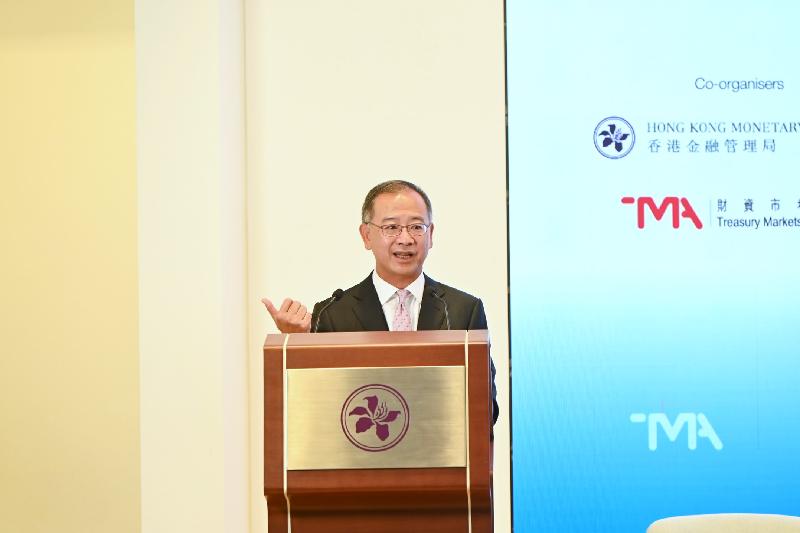Government gazettes compulsory testing notice
The Government exercises the power under the Prevention and Control of Disease (Compulsory Testing for Certain Persons) Regulation (Cap. 599J) and publishes in the Gazette a compulsory testing notice, which requires any person who had been present at six specified premises during the specified period (persons subject to compulsory testing) to undergo a COVID-19 nucleic acid test.
Since there were outbreaks of upper respiratory tract infection and/or influenza-like illness in six schools, and the symptoms of the diseases concerned are similar to those of COVID-19, for prudence's sake, the relevant schools or their specified levels are covered in the compulsory testing notice. Persons who have completed a COVID-19 vaccination course would be taken to have complied with the requirements set out in the compulsory testing notice.
Persons subject to compulsory testing in accordance with a compulsory testing notice must go to any of the mobile specimen collection stations, community testing centres (CTCs) or recognised local medical testing institutions to undergo professional swab sampling in fulfilling the requirements for compulsory testing. Young children may continue to undergo the test using a stool specimen.
If Tropical Cyclone Warning Signal No. 3 or above is hoisted or the Red or Black Rainstorm Warning Signal or the post-super typhoon "extreme conditions" announcement by the Government is in force at any time during the period for undergoing the compulsory testing, the period for undergoing the compulsory testing will be extended for one day.
The Comirnaty and CoronaVac vaccines are highly effective in preventing severe cases and deaths from COVID-19. They can provide protection to those vaccinated to prevent serious complications and even death after infection. The Government appeals to persons who are not yet vaccinated, especially senior citizens, chronic patients and other immunocompromised persons who face a higher chance of death after COVID-19 infection, to get vaccinated as soon as possible for better self-protection before the fifth wave strikes in Hong Kong.
Details of the compulsory testing notice are in Annex 1.
Subsequent to the announcement by the Centre for Health Protection (CHP) on the updated quarantine arrangements of local COVID-19 cases with a mutant strain, persons who resided or worked within the same building as the residence of relevant cases will be subject to compulsory testing on the third, seventh, 12th and 19th days counting from the announcement of the relevant confirmed case by the Department of Health (DH). Relevant persons have to undergo testing on specified dates. They will also be required to undergo self-monitoring until the 21st day (see the details of the buildings and dates of testing at www.coronavirus.gov.hk/pdf/CTN_Specified_premises_and_Dates_of_Testing.pdf). For prudence's sake, the above compulsory testing requirement applies to those who have completed a COVID-19 vaccination course as well.
In accordance with the compulsory testing notice issued earlier, all household members of close contacts are required to undergo compulsory testing. Any person who had lived with a person placed under quarantine pursuant to section 22 of the Prevention and Control of Disease Regulation (Cap. 599A) (person under quarantine) in the same residential unit on the date of commencement of quarantine or during the 14 days before that day, and who becomes aware of the quarantine of the person under quarantine when the relevant quarantine has not yet been completed, has to undergo testing within two days of him or her becoming aware that the person under quarantine has been placed under quarantine and report to the Government the result of the test by phone (6275 6901), fax (2530 5872) or email (ct@csb.gov.hk) within three days of undergoing the test. For prudence's sake, the above compulsory testing requirement applies to those who have completed a COVID-19 vaccination course as well.
CTCs provide testing services for the public, including free service for persons subject to compulsory testing. Booking and walk-in services are available. Members of the public only need to provide simple personal information on the 24-hour booking system (www.communitytest.gov.hk/en). The system shows the booking status of the centres for the coming two weeks to facilitate the public's planning and selection of a suitable testing centre and a time slot for testing. The testing centres will accord priority to serve individuals with advance bookings. As of 6pm today (September 29), there were around 28 000 booking places available for tomorrow (September 30) at the CTCs, and around 91 per cent and around 95 per cent availability for booking places for the coming seven days and 14 days respectively. Members of the public may call the testing centres for enquiries on the availability of bookings or walk-in quotas before visiting the centres.
The Government will continue to set up a mobile specimen collection station at The Zenith, 3 Wan Chai Road, tomorrow for residents and workers subject to compulsory testing for free. Outdoor mobile specimen collection stations will be closed if the Strong Wind Signal No. 3 or Red Rainstorm Warning Signal is hoisted while all mobile specimen collection stations together with all CTCs will be closed when the No. 8 Gale or Storm Signal or higher or Black Rainstorm Warning Signal is hoisted.
Coupled with 18 CTCs, there will be a total of 28 CTCs/mobile specimen collection stations in various districts tomorrow to provide free service for persons subject to compulsory testing. The testing capacity should be sufficient to meet the demand. The opening dates and operating hours of the mobile specimen collection stations in various districts providing free COVID-19 nucleic acid testing services for the general public are stated in Annex 2. Persons subject to compulsory testing and those with the "LeaveHomeSafe" COVID-19 exposure notification or SMS notification from the CHP reminding them to undergo testing as soon as possible may receive free testing at CTCs or mobile specimen collection stations (if the service scope is applicable).
Persons subject to compulsory testing may choose to undergo testing via the following routes:
1. To visit any of the mobile specimen collection stations (see the list and target groups (if applicable) at www.coronavirus.gov.hk/eng/early-testing.html) for testing;
2. To attend any of the CTCs (see the list at www.communitytest.gov.hk/en);
3. To self-arrange testing provided by private laboratories which are recognised by the DH and can issue SMS notifications in respect of test results (see the list at www.coronavirus.gov.hk/pdf/List_of_recognised_laboratories_RTPCR.pdf), and the relevant sample must be taken through combined nasal and throat swabs; or
4. To use a specimen bottle distributed to the relevant specified premises by the CHP (if applicable), and return the specimen bottle with the stool sample collected as per relevant guidelines.
If a person subject to compulsory testing obtains a medical certificate issued by a registered medical practitioner, proving that he or she is unfit to undergo testing using a sample taken through combined nasal and throat swabs because of health reasons, then he or she may choose to undergo testing via the following routes by providing a deep throat saliva sample:
1. To obtain a deep throat saliva specimen collection pack from any of the 121 post offices, vending machines set up at 20 MTR stations or 47 designated general out-patient clinics (GOPCs) of the Hospital Authority and return the specimen to one of the designated specimen collection points (see the distribution points and times, and the specimen collection points and times, at www.coronavirus.gov.hk/eng/early-testing.html);
2. To undergo testing at any of the GOPCs of the Hospital Authority as instructed by a medical professional of the Hospital Authority; or
3. To self-arrange testing provided by private laboratories which are recognised by the DH and can issue SMS notifications in respect of test results.
A spokesman for the Food and Health Bureau cautioned that testing received at the Accident and Emergency Departments of the Hospital Authority or during hospital stays, or testing provided by private laboratories which cannot issue SMS notifications in respect of test results, does not comply with the requirements of the aforementioned compulsory testing notice.
"If persons subject to compulsory testing have symptoms, they should seek medical attention immediately and undergo testing as instructed by a medical professional. They should not attend the mobile specimen collection stations or the CTCs."
Persons subject to compulsory testing must keep the SMS notifications containing the result of the test and the relevant medical certificate (if applicable) for checking by a law enforcement officer when the officer requires the persons to provide information about their undergoing the specified test.
Furthermore, persons subject to testing under the compulsory testing notices should, as far as reasonably practicable, take appropriate personal disease prevention measures including wearing a mask and maintaining hand hygiene, and, unless for the purpose of undergoing the specified test, stay at their place of residence and avoid going out until the test result is ascertained as far as possible.
Any enquiries on compulsory testing arrangements may be addressed to the hotline at 6275 6901, which operates daily from 9am to 6pm. If persons subject to compulsory testing plan to conduct testing at any of the CTCs, they can check the centre's appointment status in advance. The hotlines of the CTCs are available at www.communitytest.gov.hk/en/info.
The Government will continue to trace possibly infected persons who had been to the relevant premises, and seriously verify whether they had complied with the testing notices. Any person who fails to comply with the testing notices commits an offence and may be fined a fixed penalty of $5,000. The person would also be issued with a compulsory testing order requiring him or her to undergo testing within a specified time frame. Failure to comply with the order is an offence and the offender would be liable to a fine at level 4 ($25,000) and imprisonment for six months.
Relevant officers of different government departments are empowered to perform certain functions under the relevant Regulations under the Prevention and Control of Disease Ordinance (Cap. 599), including requesting individuals to provide information and assistance when necessary. Any person who fails to comply with the relevant request commits an offence and would be liable to a fine at level 3 ($10,000). Collection and use of any personal data for conducting COVID-19 tests must meet the requirements under the Personal Data (Privacy) Ordinance (Cap. 486). Government departments or testing service providers which handle the relevant information may provide the data to the DH or other relevant departments for anti-epidemic purposes as necessary. The workflow does not involve the provision of any personal data to organisations or persons outside Hong Kong.
The spokesman said, "The Government urges all individuals who are in doubt about their own health conditions, or individuals with infection risks (such as individuals who visited places with epidemic outbreaks or contacted confirmed cases), to undergo testing promptly for early identification of infected persons."

